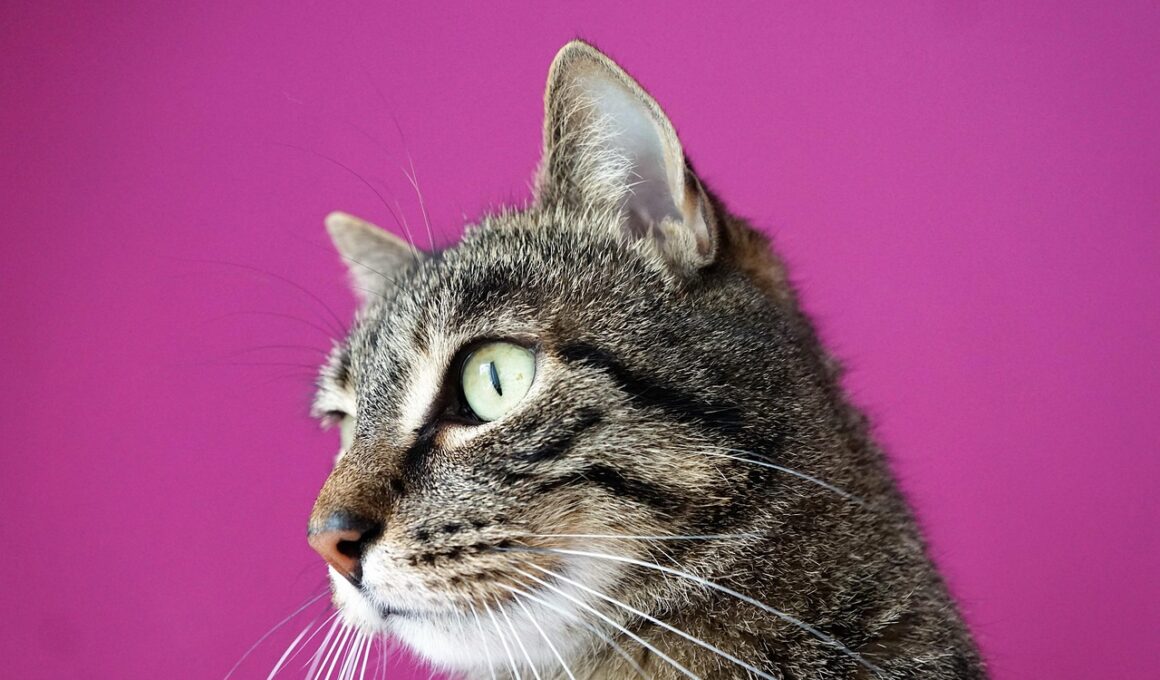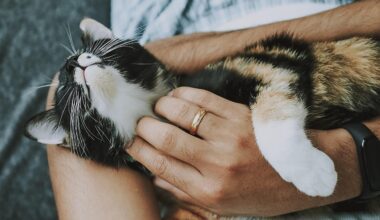Changes in Appetite: Stress Signals in Cats
As a cat owner, recognizing the signs that indicate your feline friend is stressed is important. One of the most significant indicators of stress in cats is a change in appetite. When a cat experiences stress, its eating habits can vary dramatically. Some cats may stop eating altogether, while others may overeat. This drastic change can be alarming for any cat parent. By observing your pet’s behavior, you can better understand its emotional state. It’s essential to establish a baseline for your cat’s normal eating habits, which helps you recognize shifts more easily. Stress in cats can be induced by various factors such as environmental changes, introduction of a new pet, or even alterations in your routine. As acute stress can lead to additional health problems, identifying these signs quickly is crucial. If you notice any changes in your cat’s appetite, it’s worth investigating the underlying causes. Consult with your veterinarian if the change persists to rule out any medical issues.
When your cat experiences stress, you may also notice behavioral changes beyond their appetite. Stress can manifest through increased aggression, hiding, or even excessive grooming. These behaviors can be include anxiety-filled pacing or uncharacteristic irritability towards you or other pets. Also, if your cat begins to vocalize more than usual, this may indicate that something is bothering them. Every cat has its unique personality, and observing their usual behavior can help you identify when they’re feeling out of sorts. Keep in mind the physical environment around them. Sometimes, a small change, such as moving their litter box, could affect their comfort. Additionally, consider their mental well-being. Stress caused by boredom might lead to changes in eating habits. Make sure your cat has access to stimulating toys and activities to keep them engaged. Cats are sensitive creatures, and understanding what triggers stress for them is vital. By being attentive to the signals your cat sends, you’ll be better prepared to provide the comfort they need during stressful situations.
Identifying Stressors for Your Cat
To assist your cat in avoiding excessive stress, identify potential stressors in their environment. It can be anything from loud noises, unfamiliar guests, or changes in your household routine. New pets or changes in family dynamics can also contribute to your cat feeling unsettled. Keep their environment as consistent as possible. If relocating furniture or changing the cat’s feeding area, do it gradually. Additionally, secure their favorite spots to retreat to when feeling overwhelmed. Cats savor their personal space and often retreat to quiet spots when experiencing anxiety. Providing additional vertical spaces by adding cat trees can give them refuge and comfort. You might also want to consider using feline pheromones, which can help reassure your furry friend. Moreover, engage in regular play sessions to keep your cat distracted from stressors, reinforcing positive mental health. Always encourage positive habits and recognize your cat’s preferences for times of play and rest. Recognizing the nuances of your cat’s moods can strengthen your bond.
When changes in appetite are persistent, consider tracking them over several days to identify patterns. Document the quantities they eat, and note any significant deviations. Are they showing particular preferences for one type of food over another? Are they consuming treats while ignoring their main meals? Noting these changes can prove invaluable when discussing your cat’s health with your veterinarian. Nutrition is vital for a cat’s health, and prolonged lack of appetite can lead to serious consequences such as weight loss and malnutrition. Your veterinarian may recommend a change in food or suggest dietary supplements that could help restore your cat’s appetite. Furthermore, stress-related behaviors can often be alleviated via targeted interventions. For example, if your cat is overwhelmed by noise, creating soundproof spaces or purchasing calming music designed for pets may benefit. Overall, addressing these matters promptly can help avoid more severe complications down the line and ensure your beloved pet remains happy and healthy.
Establishing a Comforting Routine
Creating a routine can instill a sense of stability, easing your cat’s anxiety. Regular feeding times, play activities, and quiet cuddle time can improve their emotional well-being. Being consistent with your cat’s daily routine allows them to anticipate what’s next. During stressful times, routine can be reassuring. Ensure your cat receives portions of quality food regularly. This consistency not only nurtures your cat but also fosters a confident demeanor. It’s likewise beneficial to schedule occasional vet check-ups to ensure their health remains optimal. Learn to recognize signs of stress and consult pet experts when needed. Sticking to regular grooming sessions can also prevent stress. Regular grooming not only maintains their appearance but can help to calm them down. It reinforces positive interactions between you and your cat, building trust. Make grooming a gentle and enjoyable activity. Consider creating a cozy spot at home where they can retreat during stressful moments. This safe place can work wonders for relaxation. Overall, a little forethought and consistent care go a long way in improving your cat’s well-being.
To promote your cat’s overall health, stimulate mental and physical activities regularly. Try incorporating some interactive toys or puzzle feeders that require your cat to solve tasks to access treats. This will engage their brain and prevent boredom, which can often lead to anxiety and stress. Keep them active by playing games with them daily, which will also help in maintaining a healthy weight. Catching a laser light or batting at feather wands can be both thrilling and a great source of exercise for your cat. Additionally, you might find it helpful to designate specific times of the day or week for engagement, making it part of their routine. Regular playtime not only provides mental stimulation, it also strengthens your bond. Furthermore, a well-exercised cat is often a more relaxed cat, fewer issues regarding appetite will arise when they are entertained and exercised appropriately. As a responsible pet owner, understanding the balance between engagement and allowing them independence is essential for fostering confidence and emotional health.
Seeking Professional Help
If you observe that stress-related appetite changes persist despite your efforts to address them, don’t hesitate to reach out to an animal behaviorist or a vet. Early intervention can prevent further complications linked to stress, such as longer-lasting psychological or physical issues. Many professional services offer consultations specifically for behavioral problems in pets. They can provide tailored strategies to help your cat better cope with its environment. Moreover, if any underlying health issues contribute to the changes in appetite, a veterinarian can diagnose those effectively. Keep in mind that stress is a serious condition for cats. Regular monitoring of their behavioral changes is key. Frequent updates on progress to your vet will ensure effective treatment as well. Don’t delay if you notice significant changes or if you feel uncertain about your cat’s behavior. With guidance from professionals, you can uncover the factors causing distress and ensure your furry friend returns to their usual self. Addressing these changes promptly and correctly shows how dedicated you are to your beloved cat.
Recognizing the fine line between normal behavioral fluctuations and true stress is essential. Changes in appetite can be among the first signals indicating something might be off, so leaning into your instincts as a cat parent is key. Moreover, continuous education on feline behavior can assist you in picking up on subtle cues. Explore resources online or attend workshops dedicated to cat care to learn more about effectively identifying stressors in your cat. Building a deeper bond with your furry companion involves understanding their needs and emotions. Always stay observant and responsive to their behavior, acknowledging that their feelings are valid. Your cat looks to you for reassurance, so developing an effective communication system with them through body language is vital. Practicing patience is essential because sometimes recovery requires time. Celebrate small victories when your cat shows positive change in behavior or appetite. Remain optimistic and encourage positivity in their environment as much as possible. By promoting love, care, and attention, you can effectively help your cat feel safe and comfortable in their home, leading to a happier, healthier life.


